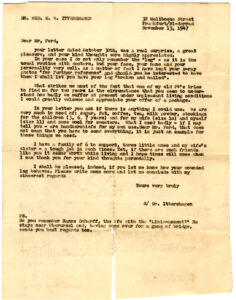A post-war letter written to Donald (Tom) Ford from Dr. Ernst Waldemar Ittershagen of Frankfurt,Germany, dated 13 November 1947. The letter was written in response to a letter that Ford had sent, thanking Ittershagen for setting his broken leg during the war and inquiring about his fate during the difficulty post-war period in Germany. Dr. Ittershagen was a surgeon who worked at the hospital at Hohemark, which was attached to the POW camp, Stalag Luft III. Ittershagen pioneered the surgical procedure of using steel pins to set badly fractured legs, and Ford, an airman who had been severely injured in a plane crash in Germany in 1943, benefitted from his surgical innovation. In the letter, Ittershagen informs Ford that he still has the x-rays of his leg, “broken and nailed.” Ittershagen eventually sent those x-rays to Ford.
This poignant letter speaks to the suffering of the German people during the post-war era. Ittershagen was somewhat surprised that Ford seemed “to understand how badly we suffer at present under unpleasant living conditions. . . . I have a family of 6 to support, three little ones and my wife’s sister—a tough job in such times.” He then embraces Ford’s offer of assistance: “I would greatly welcome and appreciate your offer of a package.”
In the postscript, Ittershagen mentioned Hanns Scharff. During the war, Hanns-Joachim Gottlob Scharff (1907-1992) was a highly successful interrogator for the Luftwaffe who was also well-liked by the POWs. His marriage to a British woman may have accounted for his “Limie-accent.” After the war, Scharff moved to the United States where he presented lectures to the Air Force and Army on his interrogation techniques. Beginning in the 1950s, he turned his attention to art and became well-known for his mosaic designs. Scharff’s designs are featured in numerous locations in the United States, including the Los Angeles City Hall and the Cinderella Castle at Walt Disney World, Florida.
Donald (Tom) Ford (1920-2015) grew up together with Vernon Goetz in Aberdeen, Maryland. They remained friends throughout their lives. At some point after the war, Ford shared this letter with Goetz and allowed him to keep it. Interview with Donald (Tom) Ford, 17 September 2014, Goucher College Special Collections and Archives; Marilyn Jeffers Walton, Rhapsody in Junk: A Daughter’s Return to Germany to Finish Her Father’s Story (Bloomington, Indiana, 2007). E-Book.
